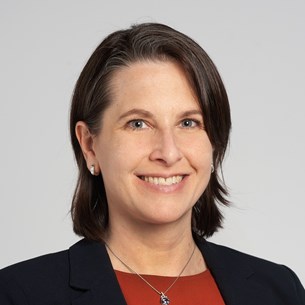Meeting
2023 ASCO Quality Care Symposium

Cleveland Clinic Taussig Cancer Institute, Cleveland, OH
Heather McKee Hurwitz, Mary Jones, Carrie Emch, Kate McCaffrey, Megan Kilbane, Kimberly Bell
Background: As part of a National Cancer Institute designated Cancer Center, our goal for minority accrual to clinical trials (CTs) is 15%, in 2022 was 13.2%, and we currently enroll at 14.1%. To maintain and grow this volume, we created an initiative to draw on our already established survivor-to-patient/caregiver mentoring program called the 4th Angel Mentoring Program (4AMP). Mentors could share their personal experiences in CTs one-on-one to mentees, which could spark interest, education, decision making, and address disparities in CTs enrollment, especially among medically underserved communities. Methods: 4AMP is an innovative, interactive approach to cancer support in which patients and caregivers are matched with trained volunteer peer mentors. Prior to 2022, the program did not directly address CTs. In April 2022, we conducted a survey of mentors to gauge interest in sharing CTs experiences, and the extent to which the current mentor pool had participated in CTs, when, and for which disease areas. Based on mentor support, we began matching along CT interest in June 2022. We publicized the program to mentors, internally on a cancer center-wide message board, in an email blast to the cancer center social work team, as well as emails and word-of-mouth to clinicians and social workers with high referral rates to the program. Results: We emailed the survey to 836 persons, 300 replied for a response rate of 36%. 87 (29%) of mentors that responded to the survey had prior participation in CTs, with 58 (66%) of those experienced mentors agreeing to speak to mentees about CTs. 6 (10%) identified as Black/African-American, 44 (75%) as White, and 8 (14%) did not share their racial identity. One patient identified as Latino/fluent Spanish speaker. The average mentor age was 57 years old. 32 (55%) identified as female and 26 (45%) as male. In response to an open-ended question, participants voiced support for the Program, reiterated interest in mentoring and supported matching along CTs experience. Mentors expressed great interest to speak with patients about their positive CTs experiences because CTs helped them on their cancer journey and they felt that sharing patient testimonials could address racial disparities in CTs. From June 2022 to February 2023, three mentees (2 male, 1 female, none identified racial/ethnic identity) matched with mentors to discuss interest in CTs. Most patient matches made by the program (673 during this period) were not due CT interest; patients can request a mentor at any time in their cancer journey and most do so near the beginning of diagnosis/treatment. Conclusions: 4AMP will continue offering matching along CTs interest and recording mentors with CTs experience. Future projects will address how to better utilize mentor testimonials about CTs, likely outside of mentoring, and how to expand interest in CTs among mentees and newly diagnosed patients.
Disclaimer
This material on this page is ©2024 American Society of Clinical Oncology, all rights reserved. Licensing available upon request. For more information, please contact licensing@asco.org
2023 ASCO Quality Care Symposium
Poster Session
Poster Session B
Health Care Access, Equity, and Disparities,Technology and Innovation in Quality of Care,Palliative and Supportive Care
Access to Clinical Trials
JCO Oncol Pract 19, 2023 (suppl 11; abstr 99)
10.1200/OP.2023.19.11_suppl.99
99
B6
Abstract Disclosures
2023 ASCO Quality Care Symposium
First Author: Laura LaNiel Tenner
2023 ASCO Quality Care Symposium
First Author: Thulasee Jose
2021 ASCO Quality Care Symposium
First Author: Katherine Ramsey Gilmore
2022 ASCO Annual Meeting
First Author: Thiago Vidal Brito